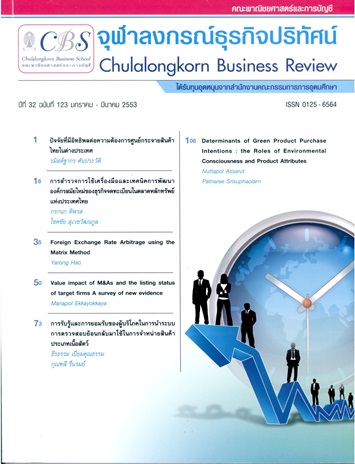Value impact of M&As and the listing status of target firms A survey of new evidence
Main Article Content
Abstract
บทคัดย่อ
บทสรุปที่ว่า การควบรวมกิจการ (acquisitions) โดยปกติแล้วทำลายความมั่งคั่งของผู้ถือหุ้นในบริษัทผู้ซื้อนั้นถูกดึงมาจากการพบเห็นการควบรวมที่บริษัทผู้ขายได้รับการจดทะเบียนในตลาดหลักทรัพย์ ในช่วงการประกาศเสนอการควบรวมนั้นอย่างดีที่สุดผู้ถือหุ้นในบริษัทผู้ซื้อจะเสมอตัว (break-even) และบ่อยครั้งที่สูญเสียความมั่งคั่ง แต่ทว่าประมาณร้อยละ 80 ของการควบรวมกิจการในตลาดซื้อขาย อำนาจในการควบคุมกิจการที่มีความตื่นตัวมากที่สุดในโลกนั้น บริษัทผู้ขายไม่ได้จดทะเบียนในตลาดหลักทรัพย์ ในการวิเคราะห์การควบรวมกิจการของบริษัทผู้ขายที่ไม่ได้จดทะเบียนในตลาดหลักทรัพย์นั้น งานวิจัยในระยะหลังๆพบอย่างสม่ำเสมอว่า บริษัทผู้ซื้อได้กำไรเหนือระดับปกติอย่างมากและอย่างมีนัยสำคัญทางสถิติ ซึ่งตรงกันข้ามกับผลกระทบต่อมูลค่าจากการควบรวมกิจการของบริษัทที่ได้รับการจดทะเบียนในตลาดหลักทรัพย์ หลักฐานงานวิจัยพวกใหม่ที่สอดคล้องกันนี้ แม้ว่าจะเพิ่งเกิดใหม่ ก็เป็นการเรียกถามความน่าเชื่อถือขององค์ความรู้เดิมที่มีเกี่ยวกับการตัดสินใจทำการควบรวมกิจการ และชี้ถึงความจำเป็นในการหาคำอธิบายอื่นๆสำหรับผลกระทบต่อมูลค่าจากการทำการควบรวมกิจการ อย่างไรก็ตามหลักฐานงานวิจัยเกี่ยวกับผลกระทบต่อความมั่งคั่งขั้นท้ายสุดจากการควบรวมกิจการของบริษัทที่ไม่ได้จดทะเบียนในตลาดหลักทรัพย์นั้นมีเพียงเบาบางและห่างไกลจากการนำมาเป็นข้อสรุปได้ การเรียนรู้เกี่ยวกับการควบรวมกิจการของบริษัทผู้ขายที่ไม่ได้จดทะเบียนในตลาดหลักทรัพย์นั้นอย่างต้องดำเนินต่อไปอีกมาก
Abstract
The much celebrated conclusion that acquisitions typically destroy shareholders’ wealth was drawn from the experiences of acquisitions of targets that are listed on a stock exchange: acquirer shareholders typically breakeven at best, and often earn significant value losses, on bid announcement. However, around 80% of the M&A population in the world’s most active markets for corporate control involve targets that are unlisted companies. When analyzing acquisitions of unlisted targets, the recent studies persistently find that the acquirers earn a large and significant announcement-period abnormal return, which is in sharp contrast with the value impact of listed-target acquisitions. This body of new and consistent evidence, though emerging, calls into question the generalizability of the traditional wisdom on the decision to acquire corporate control and requires alternative explanations for the value impact of M&As. Yet, evidence on the ultimate wealth effects of acquisitions of unlisted targets is still sparse and far from conclusive. Much remains to be learned about deals involving an unlisted target.
Article Details
Opinions and discussions in papers published by the Creative Business and Sustainability Journal (CBSJ) are deemed as personal opinions and the responsibility of the writers. They are not the opinions or responsibility of the Chulalongkorn Business School of Chulalongkorn University.
Papers, content, information etc. appearing in the Journal are deemed to be the copyright property of the Chulalongkorn Business School of Chulalongkorn University. Anybody or any organization that wishes to publish any part of them or use them in any way must obtain written permission from the Chulalongkorn Business School, Chulalongkorn University.


